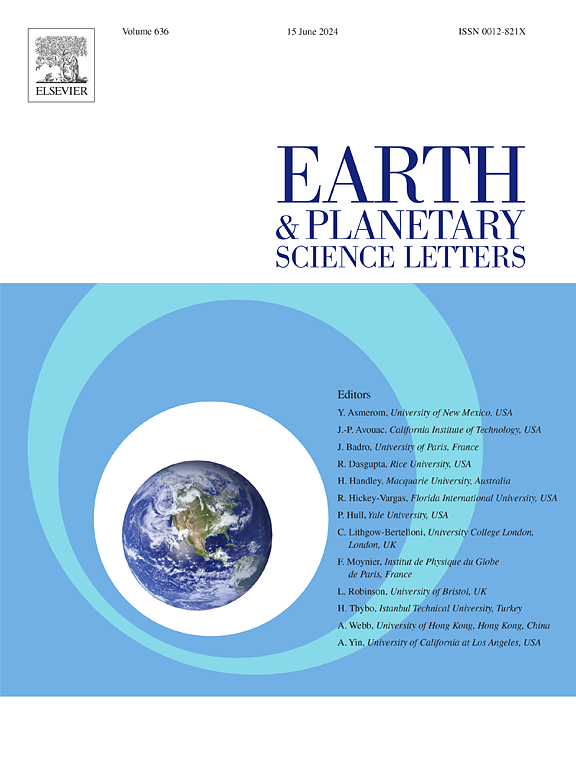新生代黄铁矿的硫同位素组成受甲烷含量和沉积环境的影响
IF 4.8
1区 地球科学
Q1 GEOCHEMISTRY & GEOPHYSICS
引用次数: 0
摘要
黄铁矿的硫同位素组成(δ34Spyr)经常被用来重建古代地球生物过程,但最近的研究表明,δ34Spyr在很大程度上取决于当地的沉积环境条件。在此,我们对过去 1.65 亿年中已发表的 3700 个黄铁矿硫同位素组成进行了全球汇编,这些同位素来自露头和海洋沉积岩芯。我们的研究表明,沉积岩芯的δ34Spyr与甲烷含量、沉积速率、岩性和距离海岸的远近有显著的统计学关系,而露头δ34Spyr则因沉积水深和岩性的不同而有不同的分布。从中生代晚期到现在,平均 δ34Spyr 没有明显的变化趋势,尽管我们认为这种时间记录受到了数据汇编固有偏差的影响。我们的研究进一步强调了利用黄铁矿的硫同位素组成推断全球环境变化时考虑沉积学和地层背景的重要性。本文章由计算机程序翻译,如有差异,请以英文原文为准。
The sulfur isotopic composition of Cenozoic pyrite is affected by methane content and depositional environment
The sulfur isotopic composition of pyrite (δ34Spyr) is often used to reconstruct ancient geobiological processes, but recent studies have shown that δ34Spyr is strongly dependent on local sedimentary environmental conditions. Here we present a global compilation of >3700 published pyrite sulfur isotopic compositions from the past 165 million years, from outcrop as well as marine sediment cores. We show that sediment core δ34Spyr has a statistically significant relationship with methane content, sedimentation rate, lithology, and proximity from shore, while outcrop δ34Spyr has distinct distributions depending on categories of depositional water depth and lithology. There are no obvious trends in the average δ34Spyr from the late Mesozoic to the present, although we suggest that this temporal record is affected by the inherent bias of data compilation. Our study further emphasizes the importance of considering sedimentology and stratigraphic context when using the sulfur isotopic composition of pyrite to infer global environmental changes.
求助全文
通过发布文献求助,成功后即可免费获取论文全文。
去求助
来源期刊

Earth and Planetary Science Letters
地学-地球化学与地球物理
CiteScore
10.30
自引率
5.70%
发文量
475
审稿时长
2.8 months
期刊介绍:
Earth and Planetary Science Letters (EPSL) is a leading journal for researchers across the entire Earth and planetary sciences community. It publishes concise, exciting, high-impact articles ("Letters") of broad interest. Its focus is on physical and chemical processes, the evolution and general properties of the Earth and planets - from their deep interiors to their atmospheres. EPSL also includes a Frontiers section, featuring invited high-profile synthesis articles by leading experts on timely topics to bring cutting-edge research to the wider community.
 求助内容:
求助内容: 应助结果提醒方式:
应助结果提醒方式:


